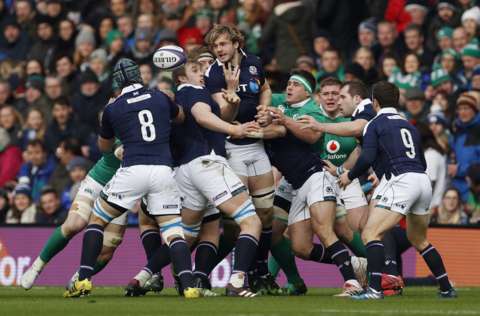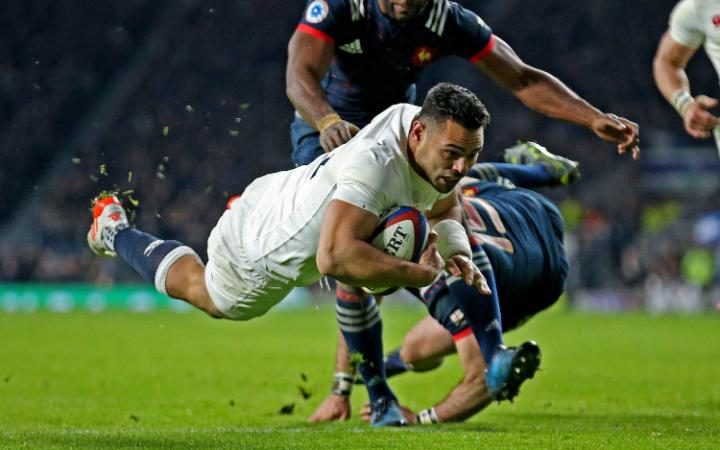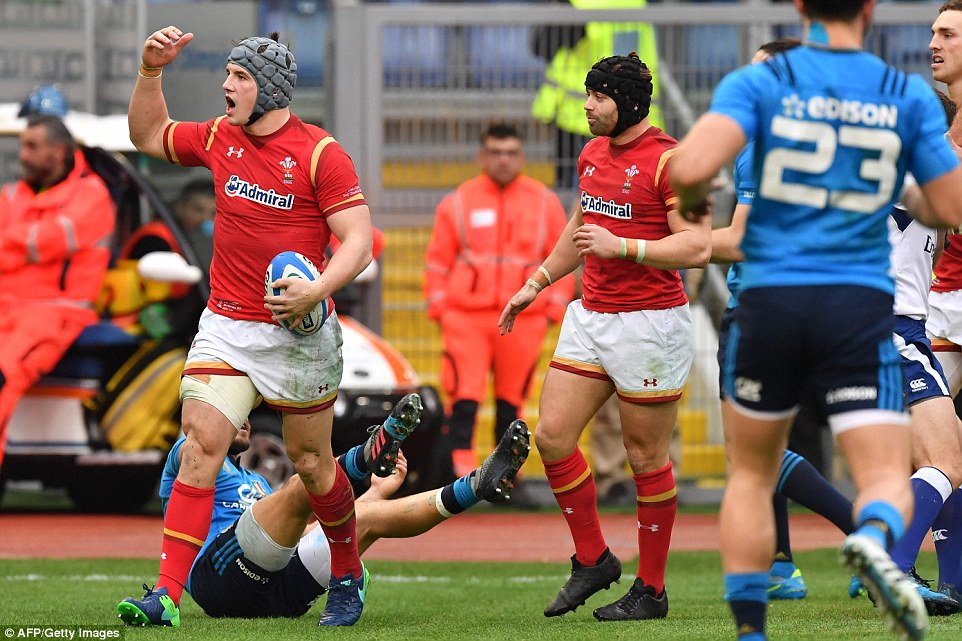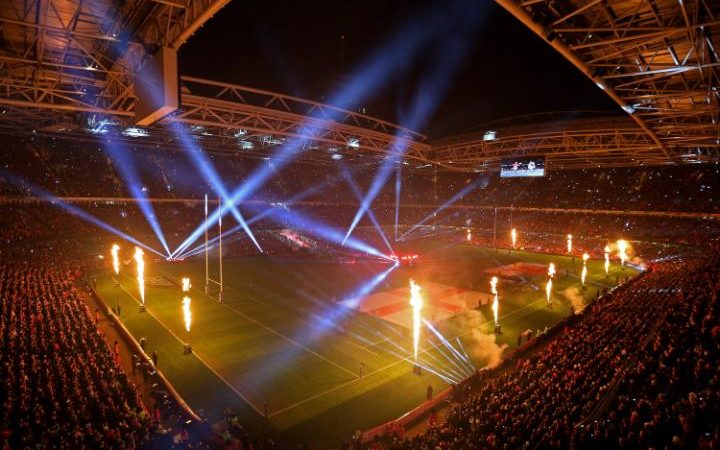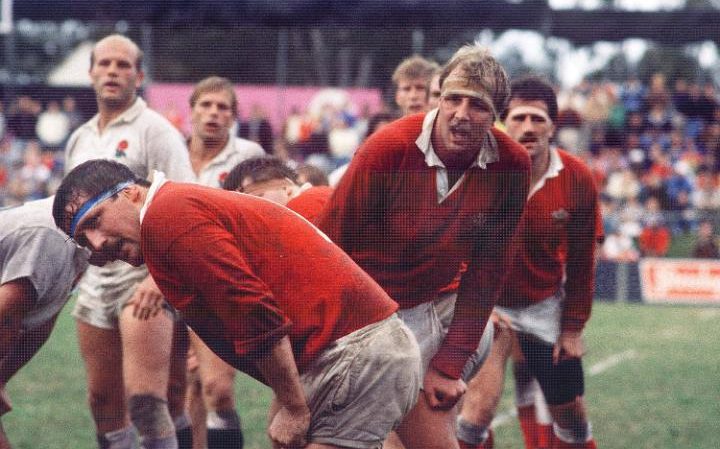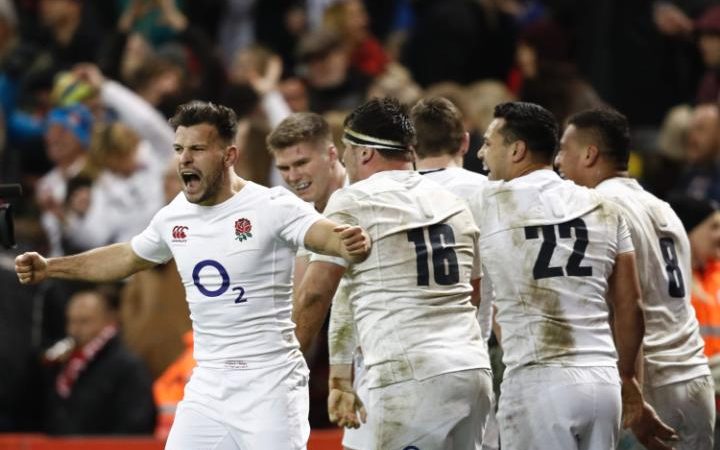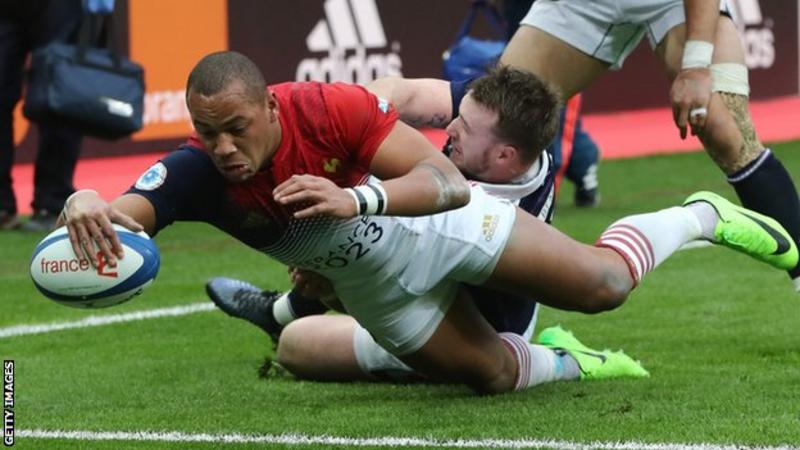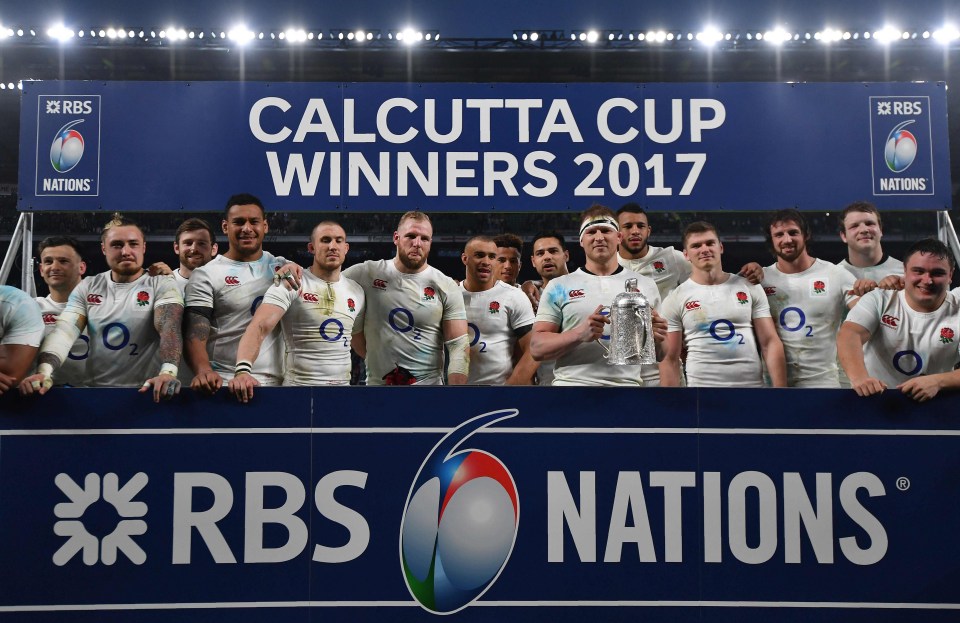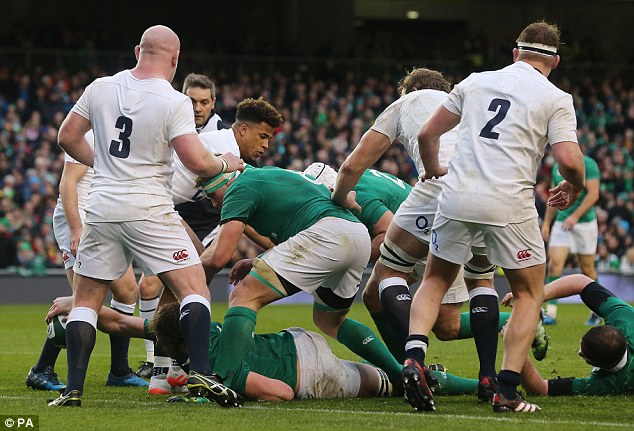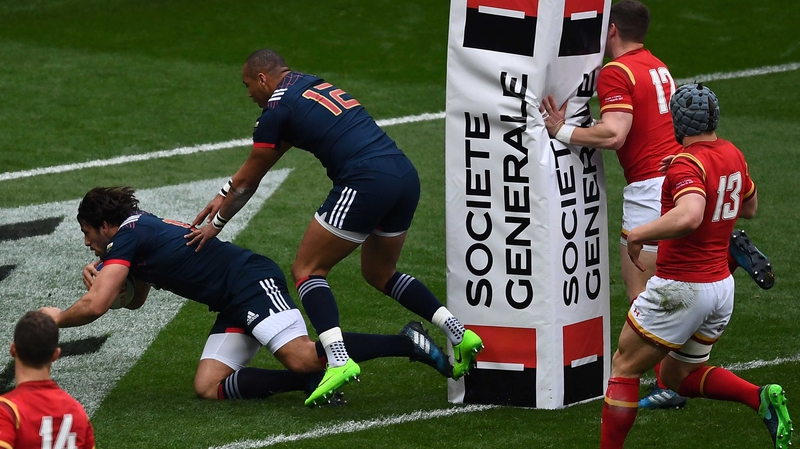The 123rd edition of rugby union's Six Nations, which begins on Saturday, is set to be watched by the highest average attendance per match of any tournament in world sport.
Over the next seven weeks the northern hemisphere showpiece, which features England, Wales, Scotland, Ireland, France and Italy, will see the cream of European rugby meet across five rounds, culminating in the final set of games on 18 March.
Scotland play Ireland in the tournament's opening match in Edinburgh at 14:25 GMT, before defending champions England host France at Twickenham at 16:50 GMT, while Wales play Italy at 14:00 on Sunday in Rome.
England, who won all of their matches in last season's tournaments, start as the bookies' favourites, with Ireland second favourites. If England win the tournament it would be a record 28th win.
Six Nations: World-beating crowds to flock to 123rd edition of rugby showpiece
BBC Sport
3 Feebruary 2017

The 123rd edition of rugby union's Six Nations, which begins on Saturday, is set to be watched by the highest average attendance per match of any tournament in world sport.
Over the next seven weeks the northern hemisphere showpiece, which features England, Wales, Scotland, Ireland, France and Italy, will see the cream of European rugby meet across five rounds, culminating in the final set of games on 18 March.
Scotland play Ireland in the tournament's opening match in Edinburgh at 14:25 GMT, before defending champions England host France at Twickenham at 16:50 GMT, while Wales play Italy at 14:00 on Sunday in Rome.
Last year's tournament attracted an average 72,000 fans a game, leading sport's global standings above American football's NFL in second and the Fifa World Cup in third - according to statistics published by European football body Uefa.
Best-attended sports events
Event............................................Average attendance per match
Six Nations..........................................72,000
NFL (American football).............................64,800
Fifa World Cup (football)............................53,592
Rugby World Cup (rugby union).......51,621
Euro 2012 (football)....................................46,481
More than a million people in total watched last season's 15 matches, with 81,916 fans packing in to see England beat Wales 25-21 at Twickenham in London in the best-attended game.
England secured the 2016 title with a perfect record of five wins from their five games, earning them the Grand Slam.
They are the bookies' favourites to win again but an Ireland team that claimed a famous win over world champions New Zealand in Chicago in November are serious contenders to regain the title they won in 2014 and 2015.

81,916 fans packed into Twickenham in London to see England beat Wales 25-21 in last year's championship
Wales are without head coach Warren Gatland - who has stepped away from his role for a year to coach the British and Irish Lions tour of New Zealand in the summer - but interim replacement Rob Howley leads a team that includes the likes of barnstorming wing George North.
Scotland come into the tournament buoyed by the domestic success of a Glasgow Warriors side currently fourth in the Pro12 and into the last eight of the top-tier European Champions Cup.
France and Italy are both under relatively new leadership, with Guy Noves and Conor O'Shea taking over in January and June 2016 respectively, but the former showed signs of their old form in an improved showing in the autumn Tests, while O'Shea was the mastermind behind Harlequins' 2012 Premiership title.
One of the key factors in deciding the destination of the title may be the strength in depth of each squad.
High-profile stars such as Ireland's Johnny Sexton, Wales' Taulupe Faletau and England's Billy Vunipola will miss the start of the tournament through injury, and the physicality of the modern game means more are sure to join them on the sidelines.
For the first time bonus points will be on offer.
In addition to the four points to be gained for a win, teams can pick up a further point for scoring four or more tries or by losing by seven points or less.
Another change is that referees have been told to pay extra attention to high tackles, with more severe penalties to be handed down to players who make contact with an opponent's head, whether accidentally or recklessly.
While the chance to clinch this season's title will spur on supporters, the tournament will also be a chance to renew age-old rivalries and add another chapter to the tournament's long history of famous results.
And in a competition that saw England captain Bill Beaumont carried shoulder-high from the pitch in 1980, David Sole's slow walk onto the Murrayfield turf in 1990, Scott Gibbs carving through the England defence at Wembley in 1999 or a fresh-faced Brian O'Driscoll's hat-trick against France in 2000, there is every prospect of new heroes being made.

Opening weekend fixtures
Saturday 4 February
Scotland v Ireland 14:25 GMT (at Murrayfield, Edinburgh)
Saturday 4 February
England v France 16:50 GMT (at Twickenham, London)
Sunday 5 February
Italy v Wales 14:00 GMT (at Stadio Olimpico, Rome)
Six Nations: World-beating crowds to flock to 123rd edition of rugby showpiece - BBC Sport
Over the next seven weeks the northern hemisphere showpiece, which features England, Wales, Scotland, Ireland, France and Italy, will see the cream of European rugby meet across five rounds, culminating in the final set of games on 18 March.
Scotland play Ireland in the tournament's opening match in Edinburgh at 14:25 GMT, before defending champions England host France at Twickenham at 16:50 GMT, while Wales play Italy at 14:00 on Sunday in Rome.
England, who won all of their matches in last season's tournaments, start as the bookies' favourites, with Ireland second favourites. If England win the tournament it would be a record 28th win.
Six Nations: World-beating crowds to flock to 123rd edition of rugby showpiece
BBC Sport
3 Feebruary 2017

The 123rd edition of rugby union's Six Nations, which begins on Saturday, is set to be watched by the highest average attendance per match of any tournament in world sport.
Over the next seven weeks the northern hemisphere showpiece, which features England, Wales, Scotland, Ireland, France and Italy, will see the cream of European rugby meet across five rounds, culminating in the final set of games on 18 March.
Scotland play Ireland in the tournament's opening match in Edinburgh at 14:25 GMT, before defending champions England host France at Twickenham at 16:50 GMT, while Wales play Italy at 14:00 on Sunday in Rome.
Last year's tournament attracted an average 72,000 fans a game, leading sport's global standings above American football's NFL in second and the Fifa World Cup in third - according to statistics published by European football body Uefa.
Best-attended sports events
Event............................................Average attendance per match
Six Nations..........................................72,000
NFL (American football).............................64,800
Fifa World Cup (football)............................53,592
Rugby World Cup (rugby union).......51,621
Euro 2012 (football)....................................46,481
More than a million people in total watched last season's 15 matches, with 81,916 fans packing in to see England beat Wales 25-21 at Twickenham in London in the best-attended game.
England secured the 2016 title with a perfect record of five wins from their five games, earning them the Grand Slam.
They are the bookies' favourites to win again but an Ireland team that claimed a famous win over world champions New Zealand in Chicago in November are serious contenders to regain the title they won in 2014 and 2015.

81,916 fans packed into Twickenham in London to see England beat Wales 25-21 in last year's championship
Wales are without head coach Warren Gatland - who has stepped away from his role for a year to coach the British and Irish Lions tour of New Zealand in the summer - but interim replacement Rob Howley leads a team that includes the likes of barnstorming wing George North.
Scotland come into the tournament buoyed by the domestic success of a Glasgow Warriors side currently fourth in the Pro12 and into the last eight of the top-tier European Champions Cup.
France and Italy are both under relatively new leadership, with Guy Noves and Conor O'Shea taking over in January and June 2016 respectively, but the former showed signs of their old form in an improved showing in the autumn Tests, while O'Shea was the mastermind behind Harlequins' 2012 Premiership title.
One of the key factors in deciding the destination of the title may be the strength in depth of each squad.
High-profile stars such as Ireland's Johnny Sexton, Wales' Taulupe Faletau and England's Billy Vunipola will miss the start of the tournament through injury, and the physicality of the modern game means more are sure to join them on the sidelines.
For the first time bonus points will be on offer.
In addition to the four points to be gained for a win, teams can pick up a further point for scoring four or more tries or by losing by seven points or less.
Another change is that referees have been told to pay extra attention to high tackles, with more severe penalties to be handed down to players who make contact with an opponent's head, whether accidentally or recklessly.
While the chance to clinch this season's title will spur on supporters, the tournament will also be a chance to renew age-old rivalries and add another chapter to the tournament's long history of famous results.
And in a competition that saw England captain Bill Beaumont carried shoulder-high from the pitch in 1980, David Sole's slow walk onto the Murrayfield turf in 1990, Scott Gibbs carving through the England defence at Wembley in 1999 or a fresh-faced Brian O'Driscoll's hat-trick against France in 2000, there is every prospect of new heroes being made.

Opening weekend fixtures
Saturday 4 February
Scotland v Ireland 14:25 GMT (at Murrayfield, Edinburgh)
Saturday 4 February
England v France 16:50 GMT (at Twickenham, London)
Sunday 5 February
Italy v Wales 14:00 GMT (at Stadio Olimpico, Rome)
Six Nations: World-beating crowds to flock to 123rd edition of rugby showpiece - BBC Sport
Last edited:



